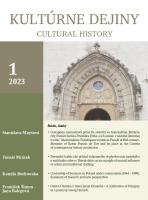Oslava Uhorska v básni Juraja Henischa
A celebration of Hungary in a poem by Georg Henisch
Author(s): František Šimon, Jana BalegováSubject(s): History, Cultural history, Source Material
Published by: VERBUM - vydavateľstvo Katolíckej univerzity v Ružomberku
Keywords: Neo-Latin; humanistic Latin literature; propempticon; Hungary
Summary/Abstract: Georg Henisch was originally from Bardejov but spent his entire life as a doctor and a teacher at the Gymnasium of St. Anna in the German town of Augsburg. Henisch also composed several poems during his studies, and these works are less well known than his other writings. Henisch wrote a so-called propempticon, a valedictory poem of farewell, in 1571 on the occasion of the return home of the future evangelical pastor of Slovenska Ľupča, Jan Janči. An obligatory component of the propempticon is praise for the destination or the homeland of the traveller, and in Henisch’s poem 58 of the 148 hexameters are devoted to praising the Kingdom of Hungary. The poet’s description of Hungary is influenced by the image of the country which was widespread in Western Europe in this period and was based on a series of topoi: fertilitas Hungariae, Hungary as a land blessed with rich soil; propugnaculum Christianitatis, Hungary as the shield of Christendom, protecting Christianity from the Ottoman Empire; and querela Hungariae, the lament of Hungary and the appeal for aid against the Turks. Henisch follows this pattern closely, and he describes Hungary as an ideal country, with fertile soil and excellent natural conditions, the homeland of hard-working people and great rulers who will drive out their powerful enemies. The work also mentions the Turkish enemies who are ravaging the land, but Hungary has splendid and fearless leaders, and the poet expresses the hope that the saints will never allow the country to perish.
Journal: Kultúrne dejiny
- Issue Year: 14/2023
- Issue No: 1
- Page Range: 67-76
- Page Count: 10
- Language: Slovak, Latin

